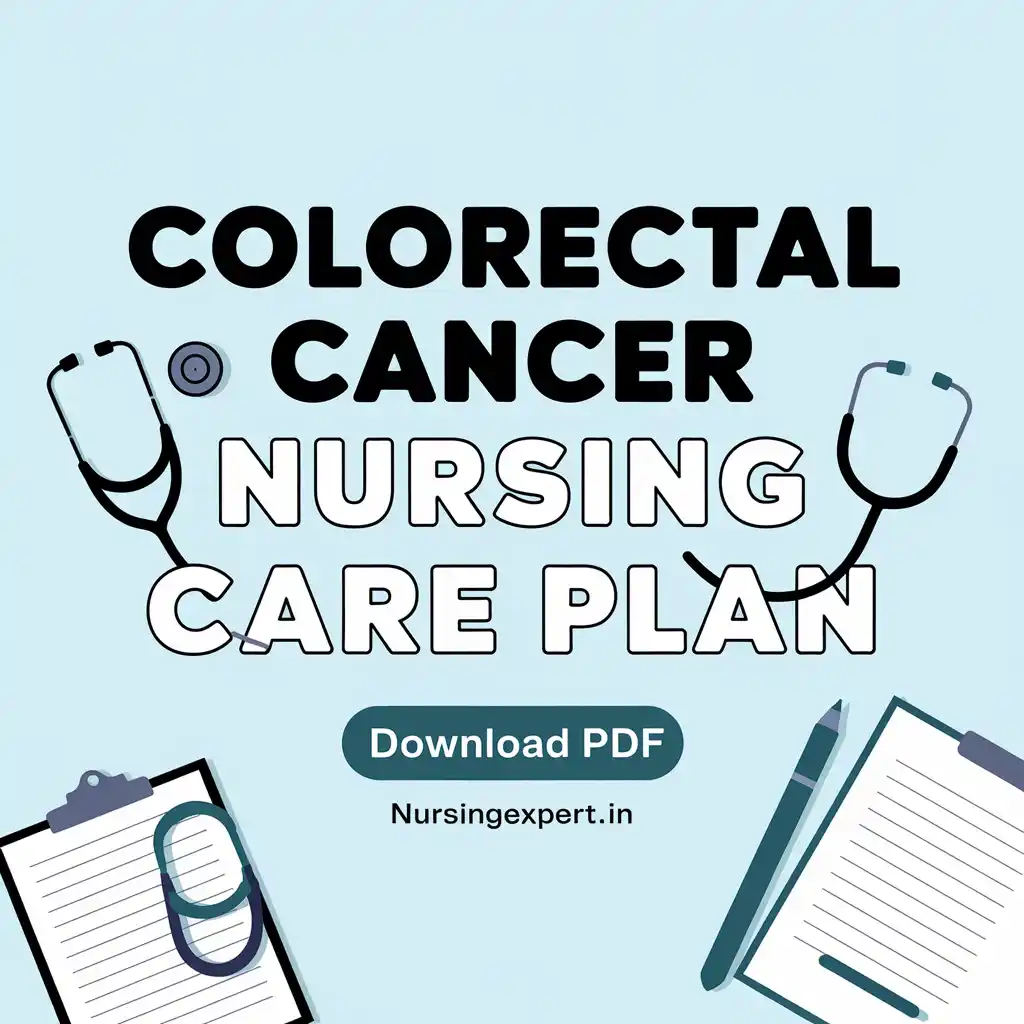This guide explains how to care for patients with colorectal cancer. It provides a clear, step-by-step plan to help you deliver effective and compassionate care. You can also download a printable version through our colorectal cancer nursing care plan pdf download for easy reference during your busy shifts.
Thank you for reading this post, don't forget to subscribe!
Understanding Colorectal Cancer
Colorectal cancer develops in the colon or rectum. This disease often affects older adults, but it may occur at any age. Patients may experience symptoms such as abdominal pain, changes in bowel habits, and unexplained weight loss. Early detection is key to a better outcome. Nurses must support patients before, during, and after treatment. A structured care plan helps ensure that you address each part of the patient’s journey.


Why a Nursing Care Plan Is Essential
A colorectal cancer nursing care plan gives you a clear roadmap for patient care. It helps you to:
- Gather information and assess the patient accurately.
- Identify key nursing diagnoses.
- Set realistic goals for patient improvement.
- Choose effective interventions.
- Monitor progress and adjust the plan when needed.
A detailed care plan also enhances patient education and builds confidence in self-care. Use a printable version (colorectal cancer nursing care plan pdf download) to keep the plan with you during your shifts.
Nursing Assessment
A thorough assessment forms the foundation of your care plan. You must gather both subjective and objective data to understand the patient’s condition fully.
Subjective Data
Ask the patient questions such as:
- “What symptoms do you experience?”
- “Do you have any pain or discomfort in your abdomen?”
- “Have you noticed changes in your bowel habits?”
- “Do you feel fatigued or lose weight unexpectedly?”
- “How do you feel about your treatment and diagnosis?”
These questions help you learn about the patient’s personal experience and concerns. They guide you in tailoring the care plan to their needs.
Objective Data
Perform a physical examination and record measurable data:
- Vital Signs: Measure blood pressure, heart rate, temperature, and respiratory rate.
- Abdominal Examination: Look for tenderness, swelling, or masses in the abdomen.
- Bowel Function: Observe changes in bowel habits or signs of obstruction.
- Laboratory Values: Check tumor markers, complete blood count (CBC), liver function tests, and electrolyte levels.
- Imaging Results: Document findings from colonoscopy, CT scans, or MRI studies.
You now have the necessary information to create a targeted colorectal cancer nursing care plan.
Nursing Diagnoses
Based on your assessment, common nursing diagnoses for colorectal cancer patients include:
- Impaired Tissue Integrity
Related to: Surgical incisions and radiation/chemotherapy effects.
Evidence: Wound dehiscence, infection, or delayed healing. - Acute Pain
Related to: Surgical intervention, tumor invasion, and treatment side effects.
Evidence: Patient-reported pain on a numeric scale and observations of discomfort. - Risk for Imbalanced Nutrition
Related to: Altered metabolism and treatment-induced side effects.
Evidence: Weight loss, poor appetite, and low albumin levels. - Anxiety
Related to: Uncertainty about prognosis and the impact of cancer on life.
Evidence: Reports of worry, restlessness, and changes in sleep patterns. - Deficient Knowledge
Related to: Lack of information about colorectal cancer, treatment, and self-care.
Evidence: Patient questions and difficulty following self-care instructions.
These diagnoses form the basis of your colorectal cancer nursing care plan. They help you decide which interventions will best support your patient.
Nursing Interventions and Rationales
Your interventions must address each diagnosis clearly. Below are key interventions along with their rationale.
1. Maintain Wound and Tissue Integrity
- Intervention: Teach proper wound care techniques.
Rationale: Effective wound care reduces the risk of infection and promotes healing after surgery. - Intervention: Monitor surgical sites for signs of infection, such as redness, swelling, or discharge.
Rationale: Early detection of infection allows for prompt treatment, which prevents further complications. - Intervention: Use sterile dressings and change them according to protocol.
Rationale: Sterile techniques minimize the risk of contamination.
2. Manage Acute Pain
- Intervention: Assess pain regularly using a standardized pain scale.
Rationale: Consistent assessment guides effective pain management and helps adjust medications. - Intervention: Administer prescribed analgesics and document patient response.
Rationale: Medications relieve pain and improve comfort, allowing the patient to participate in their recovery. - Intervention: Offer non-pharmacological methods like deep breathing exercises and relaxation techniques.
Rationale: These methods can reduce pain perception and improve overall well-being.
3. Support Nutritional Needs
- Intervention: Collaborate with a dietitian to develop a high-protein, nutrient-rich diet.
Rationale: Adequate nutrition supports healing, maintains muscle mass, and improves treatment tolerance. - Intervention: Encourage the patient to eat small, frequent meals.
Rationale: Smaller meals help manage appetite changes and prevent nausea. - Intervention: Monitor weight and laboratory values such as albumin.
Rationale: Tracking these parameters helps assess nutritional status and effectiveness of dietary interventions.
4. Alleviate Anxiety
- Intervention: Provide clear, concise information about the diagnosis, treatment options, and expected outcomes.
Rationale: Understanding the process helps reduce uncertainty and anxiety. - Intervention: Encourage the patient to express their fears and concerns.
Rationale: Open communication allows you to address anxiety directly and tailor support. - Intervention: Recommend counseling or support groups.
Rationale: Peer support and professional counseling can help patients manage stress and adapt to their condition.
5. Enhance Patient Knowledge
- Intervention: Offer educational sessions on colorectal cancer and its treatment.
Rationale: Informed patients are more likely to adhere to treatment plans and manage self-care effectively. - Intervention: Provide written materials and visual aids.
Rationale: These resources reinforce verbal instructions and serve as a reference at home. - Intervention: Review and discuss educational content during follow-up visits.
Rationale: Regular reviews ensure that the patient remains informed and confident in their care.
Each intervention directly supports the goals set in your colorectal cancer nursing care plan. Clear, direct actions help improve patient outcomes.
Sample Colorectal Cancer Nursing Care Plan
Below is a sample table that organizes your care plan into seven columns. Use this template to structure your assessments, diagnoses, and interventions clearly.
| Assessment | Diagnosis | Inference | Planning | Intervention | Rationale | Evaluation |
|---|---|---|---|---|---|---|
| Patient presents with a surgical incision, redness around the wound, and reports mild pain. Lab values indicate elevated white blood cell count. | Impaired Tissue Integrity related to surgical incision and treatment side effects. | The surgical site is at risk for infection due to compromised tissue integrity. | Patient will show improved wound healing and report minimal pain within 5 days. | Teach proper wound care; change dressings as per protocol; monitor for signs of infection. | Proper wound care prevents infection and supports healing. | Redness decreases; pain reduces; no signs of infection are observed. |
| Patient reports moderate to severe pain in the abdomen after surgery. | Acute Pain related to surgical trauma and tumor invasion. | Pain affects mobility and overall recovery. | Patient will report pain at or below 3/10 within 24 hours. | Administer prescribed analgesics; reassess pain every 4 hours; use non-pharmacological pain relief methods. | Effective pain control enhances comfort and participation in recovery. | Pain score reduces; patient reports improved comfort. |
| Patient shows signs of weight loss and decreased appetite. | Risk for Imbalanced Nutrition: Less Than Body Requirements related to treatment side effects and altered metabolism. | Inadequate nutrition may delay healing and recovery. | Patient will maintain weight and show improved nutritional markers within 1 month. | Collaborate with a dietitian; encourage small, frequent meals; monitor weight and lab values. | Adequate nutrition supports healing and improves strength. | Weight stabilizes; lab values improve; patient reports better appetite. |
| Patient appears anxious and expresses fear about cancer recurrence. | Anxiety related to uncertainty about prognosis and treatment outcomes. | Anxiety may affect treatment adherence and quality of life. | Patient will verbalize reduced anxiety and participate in counseling by discharge. | Provide clear information; encourage expression of fears; refer to support groups and counseling services. | Reducing anxiety improves emotional well-being and treatment adherence. | Patient reports decreased anxiety; participates actively in support sessions. |
| Patient demonstrates confusion about self-care and treatment procedures. | Deficient Knowledge regarding colorectal cancer care and self-management. | Lack of understanding may lead to poor self-care and complications. | Patient will verbalize key care procedures and show competency in self-care before discharge. | Conduct educational sessions; provide written and visual materials; review content during follow-up visits. | Education empowers patients to manage their condition effectively. | Patient accurately explains procedures; demonstrates proper self-care techniques. |
This table serves as a tool to guide your practice. You can modify it based on individual patient needs and clinical settings.
Real-Life Scenarios
Let’s explore a few scenarios to see how this care plan works in practice.
Case Study: Ms. Davis
Background:
Ms. Davis is a 62-year-old patient who underwent surgery for colorectal cancer. She has a healing surgical incision and experiences moderate abdominal pain. She also expresses anxiety about her prognosis.
Assessment:
You note that her wound shows slight redness and tenderness. Ms. Davis reports a pain score of 6/10. She appears worried during conversations about her treatment.
Intervention:
You administer analgesics, teach proper wound care, and offer emotional support. You also educate her about her condition and the importance of follow-up visits. You use visual aids and written materials to reinforce your instructions.
Outcome:
Within 48 hours, Ms. Davis reports a pain score of 3/10. Her wound shows improved healing, and her anxiety decreases as she becomes more informed about her care plan.
Case Study: Mr. Patel
Background:
Mr. Patel is a 58-year-old patient receiving treatment for colorectal cancer. He experiences weight loss and has poor appetite. He shows signs of nutritional deficiency and expresses confusion about dietary changes.
Assessment:
You observe that Mr. Patel’s weight has dropped significantly over the past month. His lab results indicate low albumin levels.
Intervention:
You collaborate with a dietitian to create a high-protein, nutrient-rich meal plan. You educate Mr. Patel about the importance of small, frequent meals. You schedule regular follow-up visits to monitor his progress.
Outcome:
Over the next month, Mr. Patel stabilizes his weight and reports an improved appetite. His lab values begin to normalize, and he demonstrates a better understanding of his nutritional needs.
These real-life examples highlight how a structured colorectal cancer nursing care plan can improve patient outcomes.
Common mistakes and How to Avoid Them
Even skilled nurses may encounter challenges. Here are common mistakes and ways to overcome them:
- Incomplete Documentation:
Failing to document patient responses accurately can lead to gaps in care. Always record assessments, interventions, and outcomes in your care plan. - Insufficient Patient Education:
Do not assume patients understand their condition. Provide clear, repeated instructions and use visual aids to enhance understanding. - Neglecting Emotional Support:
Focus not only on physical care but also on the emotional well-being of your patients. Incorporate counseling and support group referrals into your plan. - Overlooking Nutritional Needs:
Monitor nutritional status closely. Regularly consult with dietitians to adjust meal plans and support recovery. - Delayed Follow-Up:
Schedule regular follow-up visits. Early detection of complications leads to timely interventions.
By addressing these pitfalls, you can refine your colorectal cancer nursing care plan and ensure comprehensive care.
Additional Tips and Best Practices
Based on years of nursing experience, consider these extra tips to enhance your practice:
- Stay Organized:
Keep your colorectal cancer nursing care plan pdf download at hand. It serves as a quick reference and ensures you cover all critical points. - Encourage Patient Involvement:
Ask patients to maintain a journal of their symptoms and concerns. This practice promotes active participation and provides valuable information for follow-up visits. - Promote Multidisciplinary Collaboration:
Work closely with physicians, dietitians, and mental health professionals. A team approach improves overall patient care. - Use Simple, Clear Language:
When educating patients, avoid technical jargon. Use clear, everyday language to ensure understanding. - Maintain Regular Communication:
Follow up with patients frequently to monitor progress and adjust care as needed. Consistent communication builds trust and improves outcomes. - Celebrate Small Victories:
Recognize improvements in pain, wound healing, and emotional well-being. Positive reinforcement boosts patient morale. - Review and Update Your Plan:
Keep your care plan current. Regularly update it based on new evidence and patient feedback.
These best practices help ensure that your colorectal cancer nursing care plan remains effective and patient-centered.
Download Your Colorectal Cancer Nursing Care Plan PDF
Enhance your practice with our complete resource. Download Your Colorectal Cancer Nursing Care Plan PDF Now! This printable guide provides detailed steps, a sample care plan table, and additional tips to support your daily patient care.
Conclusion
A well-structured colorectal cancer nursing care plan is essential for delivering high-quality patient care. This guide outlines clear assessments, accurate diagnoses, targeted interventions, and ongoing evaluations to support your patients. By following these steps and using our printable colorectal cancer nursing care plan pdf download, you can improve outcomes and empower your patients with the knowledge they need. Your dedication and clear care strategies make a significant difference in your patients’ lives.
References and Sources
- Mayo Clinic. “Colorectal Cancer.” Mayo Clinic Website
- American Cancer Society. “Colorectal Cancer.” American Cancer Society Website
- National Cancer Institute. “Colon and Rectal Cancer.” NCI Website
- Medscape. “Management of Colorectal Cancer.” Medscape Website
- UpToDate. “Colorectal Cancer: Diagnosis and Management.” UpToDate


